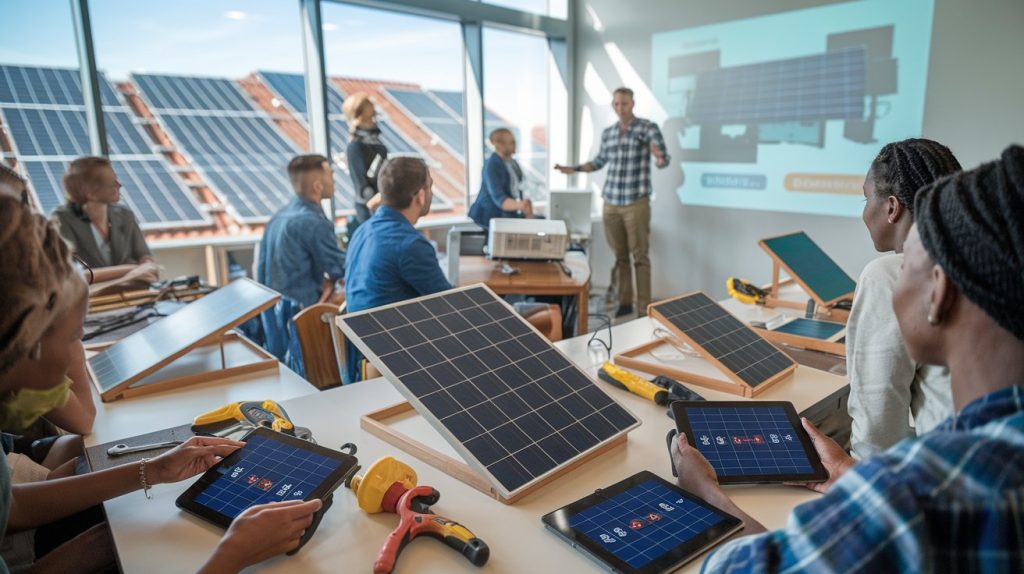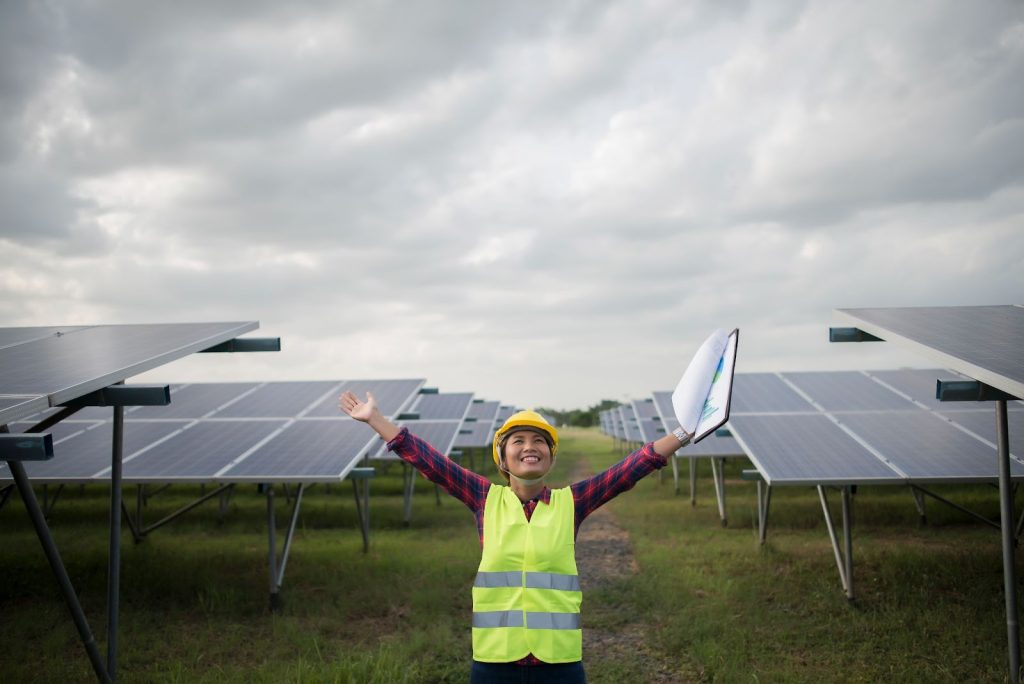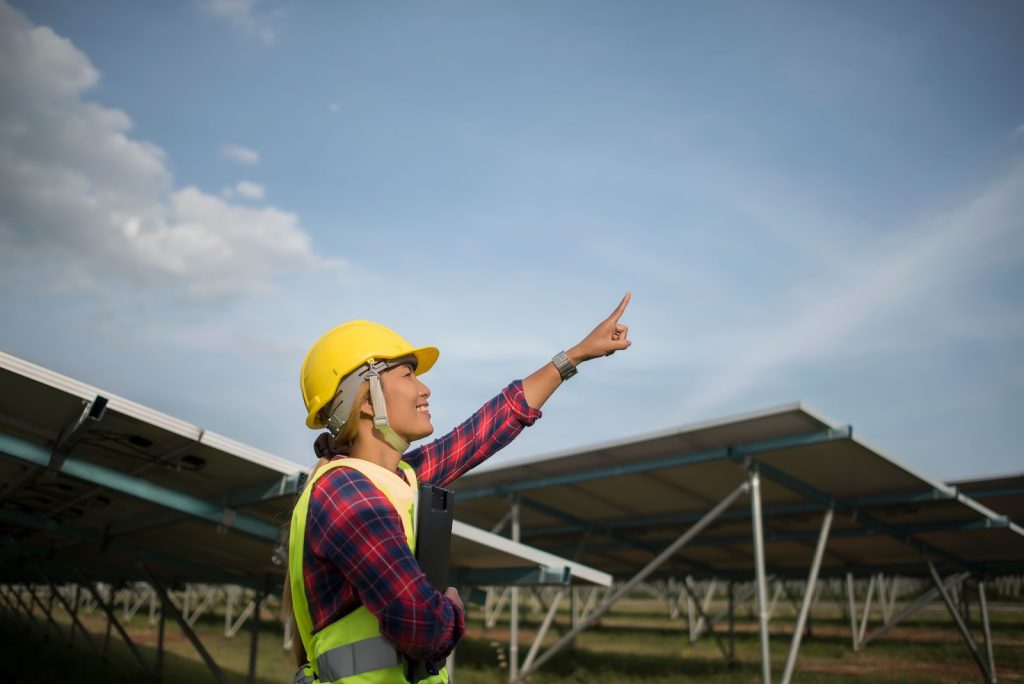Importance of Solar Energy Education for Eco-Friendly Solutions and Climate Change Action

As the world continues to grapple with the pressing challenges of climate change, there’s a growing recognition that the transition to renewable energy is crucial for a sustainable future.
The Power of Solar Energy
Among all renewable sources, solar energy stands out due to its abundance, accessibility, and minimal environmental impact. However, to fully harness the potential of solar power, a crucial factor remains: solar energy education.
The Role of Education in Solar Energy Transition
Education is the foundation of any societal transformation, and in the case of solar energy, it’s no different. To make solar energy the dominant force in global power generation, we need to educate the current and future generations.
Building a Skilled Workforce and Awareness
This is not just about creating a skilled workforce but also about fostering awareness and enthusiasm for clean energy solutions.
The Solar Energy Skills Gap: A Growing Concern

Rising Demand for Skilled Solar Professionals
One of the biggest obstacles to the rapid adoption of solar energy is the skills gap in the sector. As solar energy grows in popularity, there is an increasing demand for workers who are not only knowledgeable about solar technology but also capable of implementing, maintaining, and expanding it.
Addressing the Skills Gap in India
In India, for example, a country that aims to achieve 500 GW of non-fossil fuel capacity by 2030, there is a notable shortage of trained solar professionals.
Educational Institutions as Key Players
Educational institutions, therefore, play a pivotal role in filling this gap. Solar energy education ensures that students, engineers, and technicians are well-equipped to meet the rising demands of the solar power industry.
Preparing a Workforce for the Future of Energy
The shift toward cleaner energy solutions requires professionals who understand the complexities of solar panel design, installation, and maintenance. From electrical engineers to installers, the workforce must be ready to support the massive infrastructure changes needed.
The Role of Formal and Vocational Education
Education, both formal and vocational, is key to ensuring the availability of these critical skills.
DADB: Empowering Digital Transformation in Solar Energy Education

Bridging the Digital Divide
DADB plays a critical role in bridging the gap between digital transformation and education in sectors like solar energy. By digitising training programs and developing online platforms, DADB can help scale solar energy education across India and beyond.
Expanding Access to Education
Through innovative digital tools and platforms, they can facilitate access to high-quality education in solar technologies, making it accessible to a larger audience.
Supporting Educational Institutions Digitally
DADB’s expertise can support educational institutions by creating e-learning platforms, digital resources, and even mobile apps that focus on renewable energy education. Their work can help foster a more informed workforce, equipped to drive forward the solar energy revolution in the digital age.
Solar Energy Education: A Catalyst for a Greener Tomorrow

- Empowering the Next Generation of Innovators
The future of solar energy depends on the innovations of tomorrow. By integrating solar energy into educational curricula, schools, universities, and vocational programs can inspire young minds to pursue careers in clean energy.
Hands-On Training for Real-World Solutions
Through hands-on training and coursework, students can develop the skills needed to design cutting-edge solar technologies that address energy challenges.
Creating Future Leaders for Solar Energy
The solar energy education ecosystem provides a platform for tomorrow’s leaders to think critically and create solutions that will contribute to a greener world.
Interactive Learning for Young Innovators
With DADB’s digital solutions, these young innovators can benefit from interactive learning experiences, virtual solar panel installations, and real-time data simulations—tools that would make the learning process both immersive and scalable.
- Supporting Government Initiatives
Governments around the world are setting ambitious goals to reduce carbon emissions and increase the share of renewable energy in their power grids.
The Need for Educational Support in Policy Goals
To meet these targets, substantial investments in education and training are needed. For instance, countries like India and Australia have introduced policies that encourage the adoption of renewable energy, but to ensure success, these policies must be supported by educational programs that provide the necessary expertise.
DADB’s Role in Enabling Government Goals
DADB can play a role in digitally enabling government initiatives by offering scalable solutions for remote learning, online certifications, and industry-driven collaborations to develop a workforce capable of fulfilling solar energy goals.
- Solar Energy and Community Development
In many developing countries, solar energy education doesn’t just impact individual careers; it also has the potential to transform entire communities.
Building Self-Sufficiency in Rural Areas
By training local populations to install and maintain solar energy systems, rural areas can become more self-sufficient and sustainable. Education on solar power provides not just economic opportunities but also enhances access to reliable and affordable energy.
Expanding Reach Through Digital Platforms
DADB could facilitate community-based digital education platforms, allowing rural populations to access solar energy training through their smartphones or computers. This approach could be instrumental in reaching underserved areas and providing sustainable energy solutions where they are needed the most.
- Bridging the Gap in Solar Research and Development
Solar energy education isn’t just about vocational training; it also fuels the future of solar research and development.
Advancing Solar Technology Through Education
Universities and research institutions play a crucial role in advancing solar technology. The more educated and motivated professionals there are, the more likely we are to see breakthroughs in solar technology that make solar energy more affordable and efficient.
Supporting Research with Digital Infrastructure
DADB’s digital infrastructure can support research institutions by providing collaboration platforms, cloud-based data analysis tools, and remote access to laboratory resources, helping accelerate solar technology advancements.
How Can We Promote Solar Energy Education?

- Integrating Solar Energy in School Curricula
One of the most effective ways to promote solar energy education is by integrating renewable energy topics into school and university curricula.
Building Awareness from a Young Age
By introducing students to the science behind solar power at an early age, we can cultivate a generation of individuals who are not only aware of its importance but also equipped to engage with and advance the industry.
Aligning Educational Content with Standards
DADB’s e-learning solutions can help develop customised educational content that aligns with national and international standards, ensuring that the next generation receives the necessary training to excel in the clean energy field.
- Offering Specialised Solar Energy Courses and Certifications
For professionals looking to specialise, universities and vocational schools can offer certification programs in solar energy, focusing on skills such as installation, system design, and energy management.
Preparing for the Evolving Solar Industry
Specialised programs will ensure that workers are ready for the evolving job market and can adapt to new technologies as they emerge.
Cutting-Edge Certification Programs
DADB can collaborate with institutions to create cutting-edge, online certification courses that are tailored to the needs of the solar energy sector, providing real-time updates on the latest trends and technologies.
- Government and Corporate Initiatives
Governments and corporations can partner to support the education and training of individuals in the solar sector.
Public-Private Partnerships for Solar Education
Public-private partnerships can help fund educational initiatives, create internships, and offer financial incentives for those pursuing careers in clean energy. These efforts will create a pipeline of skilled workers ready to support the growing solar industry.
Scaling Solar Education through Digital Platforms
DADB can assist both government and corporate partners by designing digital platforms that support these partnerships, ensuring that solar education programs are accessible and scalable.
A Greener Tomorrow Starts with Education
As the world accelerates its transition to renewable energy, solar energy education becomes more crucial than ever.
Preparing the Next Generation of Solar Leaders
To meet our climate goals, we must ensure that the next generation of innovators, technicians, and engineers is prepared to embrace the challenges and opportunities of solar power.
Fostering a Culture of Learning and Innovation
By fostering a culture of learning and innovation, we can pave the way for a cleaner, more sustainable future. It’s clear that solar energy education isn’t just an investment in knowledge—it’s an investment in our planet’s future.
Realising a Greener Tomorrow with Solar Education
As more individuals become educated in solar technologies, the dream of a greener tomorrow will become an achievable reality for all. With the support of DADB’s industry-relevant online courses, we can transform solar energy education, making it more accessible, scalable, and impactful.

